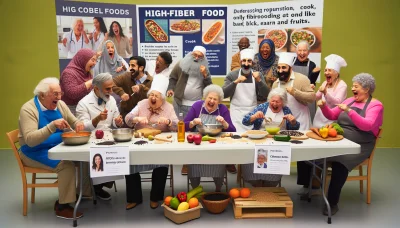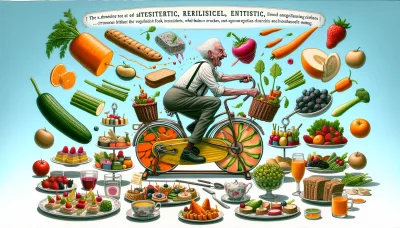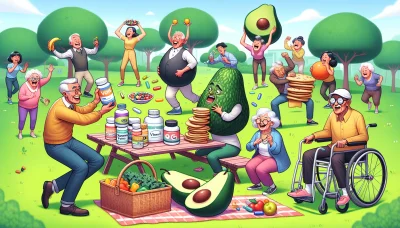Free food card for seniors Quiz
Test Your Knowledge
Question of
Understanding Free Food Cards for Seniors
Eligibility Criteria for Free Food Assistance
- Age Requirements
- Income Guidelines
- Special Circumstances and Exceptions
How to Apply for a Free Food Card
- Application Process Overview
- Necessary Documentation
- Where to Apply: Online and Offline Options
Types of Food Assistance Programs for Seniors
- Government-Sponsored Programs
- Non-Profit and Community Initiatives
- Private Sector Support
Maximizing Benefits of Free Food Cards
-
Budgeting with Your Food Card
- Tracking Spending
- Planning Meals Around Benefits
- Finding Deals and Discounts
-
Nutritional Value and Food Card Purchases
- Choosing Healthy Options
- Understanding Nutrition Labels
- Seeking Nutritional Advice
-
Renewal and Continuation of Benefits
- Monitoring Expiration Dates
- Recertification Process
- Dealing with Discontinuation or Reductions
Special Dietary Needs for Seniors
Managing Dietary Restrictions
Identifying Common Senior Dietary Restrictions
As individuals age, dietary restrictions often become an integral part of managing health. Common restrictions include low sodium for heart health, reduced sugar for diabetes, and softer foods for those with dental issues.
Adapting Meals for Health Conditions
Adapting meals to meet the specific health conditions of seniors is crucial. This can involve modifying textures, reducing certain ingredients, and focusing on nutrient-dense foods to accommodate their needs.
Consulting with Healthcare Providers
It's important for seniors and their caregivers to consult with healthcare providers to understand dietary needs and restrictions fully. This ensures that the diet supports overall health without exacerbating any conditions.
Importance of Balanced Diets in Senior Years
Macronutrient Balance
A balanced diet with the right mix of carbohydrates, proteins, and fats is essential for maintaining energy levels and supporting bodily functions in seniors.
Vitamins and Minerals Essentials
Vitamins and minerals support immune health, bone health, and prevent chronic diseases. Ensuring a diet rich in fruits, vegetables, lean proteins, and whole grains can help meet these nutritional needs.
Hydration and Health
Hydration is often overlooked but is crucial for senior health, impacting everything from kidney function to cognitive performance. Adequate fluid intake is a must.
Supplements and Senior Diets
When Supplements Are Necessary
There are instances where diet alone might not meet all nutritional needs due to health conditions or decreased food intake. In such cases, supplements can play a vital role.
Risks and Benefits of Supplements
While supplements can help fill nutritional gaps, they also come with risks, such as interactions with medications. It's important to approach supplementation with caution and under medical advice.
Choosing the Right Supplements
Selecting the right supplements involves understanding the specific needs of the senior, considering any health conditions, and consulting healthcare providers for recommendations.
Planning Meals with a Free Food Card
Creating a Weekly Meal Plan
- Sample Meal Plans
- Seasonal Eating Strategies
- Incorporating Variety and Balance
Cooking for One or Two
- Simplifying Recipes
- Storage and Leftovers Management
- Efficient Cooking Methods
Community Resources for Meal Planning
- Local Cooking Classes and Workshops
- Senior Centers and Support Groups
- Online Resources and Apps
Overcoming Common Dietary Challenges for Seniors
Addressing Appetite Loss in Seniors
Identifying Causes of Reduced Appetite
Understanding the root causes of appetite loss in seniors is crucial for addressing the issue effectively. Factors can include medication side effects, emotional distress, or underlying health conditions.
Tips to Stimulate Appetite
Encouraging more frequent, smaller meals instead of three large ones can help. Introducing nutrient-dense snacks and enhancing the flavor of food with spices or herbs may also stimulate appetite.
When to Seek Professional Help
If appetite loss persists or is accompanied by significant weight loss, consulting a healthcare professional is essential to rule out any serious underlying conditions.
Difficulty Chewing or Swallowing (Dysphagia)
Soft Food Diet Ideas
Incorporating soft foods such as mashed potatoes, soups, and scrambled eggs into the diet can ease the difficulty of chewing and swallowing.
Swallowing Therapy Techniques
Professional swallowing therapy can teach exercises and techniques to make swallowing safer and easier.
Adaptive Eating Utensils and Aids
Utensils with easy-grip handles, cups with straws, and plate guards can assist those with dysphagia in eating independently and safely.
Navigating Food Intolerances and Allergies
Identifying Triggers
Keeping a food diary and working with a healthcare provider can help identify specific food intolerances and allergies.
Safe Food Alternatives
Once triggers are identified, finding safe and nutritious alternatives is crucial. For example, those with lactose intolerance can opt for lactose-free milk or plant-based alternatives.
Reading Food Labels for Hidden Allergens
Learning to read and understand food labels is essential for avoiding hidden allergens. This includes recognizing alternative names for common allergens.
Eating Well on a Limited Budget
Smart Shopping Tips for Seniors
- Buying in Bulk : Save money by purchasing non-perishable items in larger quantities.
- Seasonal Produce Purchasing : Buy fruits and vegetables when they are in season to ensure lower prices and fresher produce.
- Couponing and Discounts : Take advantage of coupons, senior discounts, and loyalty programs at grocery stores.
Utilizing Community Gardens and Food Banks
- Finding Local Community Gardens : Join a community garden to grow your own fruits and vegetables, reducing grocery bills.
- Accessing Food Banks and Pantries : Locate nearby food banks and pantries for access to free or low-cost food.
- Volunteering for Additional Benefits : Some organizations offer food in exchange for volunteer work.
Preparing Economical and Nutritious Meals
- Easy and Affordable Recipes : Focus on recipes that require minimal, inexpensive ingredients.
- Batch Cooking and Freezing : Prepare meals in large quantities and freeze portions for later to save both time and money.
- Reducing Food Waste : Use all parts of food products and save leftovers to minimize waste and stretch your food budget.
Social Aspects of Eating for Seniors
Group Dining Opportunities
- Senior Center Lunch Programs
- Potlucks and Community Events
- Dining Clubs and Groups
The Role of Social Interaction in Meal Times
- Encouraging Family Meals
- The Psychological Benefits of Shared Dining
- Combating Loneliness Through Shared Meals
Food Delivery Services and Social Engagement
- Meal Delivery Options for Seniors
- Combining Social Visits with Meal Delivery
- Virtual Meal Sharing Experiences
Staying Informed About Food Assistance Changes
-
Keeping Up with Policy Updates
- Government Program Changes
- Advocacy Groups and Information Sharing
- Subscribing to Newsletters and Alerts
-
Technology Tools for Managing Food Assistance
- Mobile Apps for Budgeting and Nutrition
- Online Forums for Peer Support
- Educational Webinars and Tutorials
-
Building a Support Network for Food Security
- Engaging with Local Community Services
- Forming Partnerships with Local Businesses
- Networking with Other Seniors for Mutual Support












